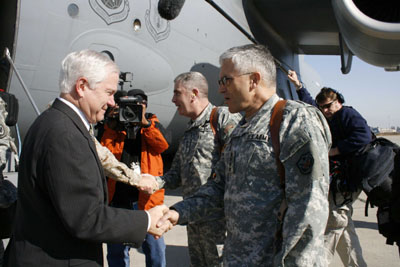US commanders wary of Iraq troop plan
(AP)Updated: 2006-12-21 14:35
|
|
On just his third day in charge of the Pentagon, Gates made the unannounced trip with the administration under intense pressure to forge a new strategy - and just hours after the president conceded, for the first time, that the US is not winning the conflict.
After meeting with top US generals at Camp Victory, Gates acknowledged concerns that rushing thousands more American troops to the battlefront could allow the Iraqis to slow their effort to take control of the country. He said no decisions have been made.
"It's clearly a consideration," Gates said of how an infusion of American troops might affect Iraqi leaders. "I think that the commanders out here have expressed a concern about that."
Gen. George Casey, the top US commander in Iraq and one of several generals who met with Gates, said he supports boosting troop levels only when there is a specific purpose for their deployment. Other military leaders have expressed uncertainty over the purpose and results of injecting more troops.
"I'm not necessarily opposed to the idea, but what I want to see happen is whether, if we do bring more American troops here, they help us progress to our strategic objectives," Casey told reporters during a news conference with Gates and other military leaders.
Gen. John Abizaid, top US commander in the Middle East, sounded a more favorable tone. The military, he said, is "looking at every possible thing that might influence the situation to make Baghdad in particular more secure."
Bush said Wednesday he is considering sending more troops to Iraq but has not made up his mind. No timetables or troop totals have been mentioned publicly, but by some accounts roughly 20,000 troops would be added to the 140,000 already there.
The president is expected to announce his decisions next month - when a new Congress convenes, controlled by Democrats ready to make the war their top concern.
Echoing some of his commanders' questions about a troop surge, Bush said, "In order to do so, there must be a specific mission that can be accomplished with more troops."
Bush is considering choices ranging from a short-term increase of thousands of troops to bring the escalating violence in Baghdad and Anbar province under control, to removing combat US forces and accelerating the training and equipping of Iraqi security forces. More than one-third of the US troops in Iraq are combat forces.
Gates, on his third day on the job, said he would not form a judgment until he has spoken to Iraqi leaders, which he is scheduled to do during his visit.
Also on the trip was Gen. Peter Pace, chairman of the Joint Chiefs of Staff, plus officials from the State Department, the National Security Council and the White House.
The timing of Gates' trip, and his entourage, underscored how important the administration believes it is to set a new direction in the Iraq war.
Gates was noncommittal when asked whether the sectarian violence in Baghdad can be quashed without taking action against the Mahdi Army of anti-American Shiite cleric Muqtada al-Sadr. Al-Sadr is a main supporter of Iraqi Prime Minister Nouri al-Maliki.
Gates said he is looking for ways to help the Iraqi government bring down the violence and "that will be a principle theme of discussions."
Bush and Gates also said they are considering increasing the overall size of the US military following recent complaints by top generals that the forces have been stretched too thin by the worldwide campaign against terrorists. They used no figures, but Bush said he was asking Gates to produce a plan for the expansion.
Gates said he was just starting to study that idea. He expressed concern that the Army and Marine Corps are not large enough to face challenges of the 21st century that might include threats in Iran and North Korea, as well as natural disasters.
The debate over increasing troops has continued for months, as the military has been struggling to quell the escalating violence - particularly sectarian bloodshed - in Iraq. The war has claimed more than 2,950 US casualties and cost roughly US$350 billion.
Some top US commanders have been wary of even a short-term troop increase, saying it might bring only a temporary respite to the violence while confronting the US with shortages of fresh troops in the future.
Military leaders are also considering an increase in the number of American advisers for Iraqi security forces.
|
||
|
||
|
|



